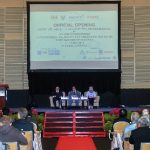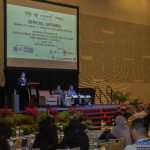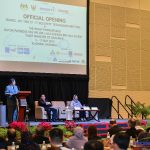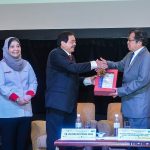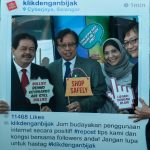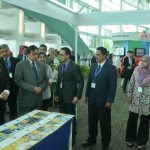Kuching, 5th May, 2015 : The Department of Standards Malaysia (Standards Malaysia) today organised meeting on information technology security techniques which was held at Borneo Convention Centre Kuching (BCCK) in mobilising local and global action to meet Malaysia’s cyber security agenda. The meeting was officiated by YB. Datuk Amar Abang Haji Abdul Rahman Zohari Tun Abang Haji Openg, Minister of Housing and Minister of Tourism, Sarawak on behalf of the Chief Minister of Sarawak followed by welcoming remarks by YB. Datuk Dr. Ewon Ebin, Minister of Science, Technology & Innovation (MOSTI) in the presence of YBhg. Datuk Fadilah Baharin, Director General of Standards Malaysia and Dr. Solahuddin Shamsuddin, Chief Technology Officer, CyberSecurity Malaysia.
More than 200 members from 30 countries participated in this meeting, which was held in Sarawak for the first time. Local, regional and international experts to include technocrats, government officials, and policy makers have deliberated on development of global standards for protection of information and ICT.
”Globally, the increasing trend of cyber threats and vulnerabilities are alarming. Cyber attacks to individuals, organisations and nations are damaging and very costly. As a result, the standard development works of information security need to catch up with the rapid growth of cyber threats and new emerging technologies to protect both nations and organisations with effective security measures. Therefore, it is vital that every National Standards Body in SC 27 actively participate in this meeting to continue to develop international standards and guidelines that are relevant to your respective countries and critical industries. ”, said YB. Datuk Amar Abang Haji Abdul Rahman Zohari.
Cybersecurity is one of the most critical concerns of the information age which forms the cornerstone of a healthy, connected world. Worldwide, increasing numbers of people are using ICTs and the services they enable. Therefore it is desirable and necessary to provide them with a safe and secure cyber environment. Moreover, vulnerabilities of ICTs are a lure to cyber warfare and espionage.
”We are in the process of translating the latest version of ISO IEC 27001 Information Security Management Systems – Requirements, as well as ISO IEC 27002 Code of practice for information security controls, to the national language or Bahasa Malaysia version. We strongly believe that it will accelerate the adoption of ISMS into the Malaysian industry especially in Critical Network Information Infrastructure or CNII sectors,” said YB Datuk Dr. Ewon Ebin at the opening ceremony.
“As the National Standards and Accreditation Body of Malaysia, we will always continue to identify relevant industry bodies like CyberSecurity Malaysia. We need to ensure that we raise the level for quality and delivery in all aspects of business through internationally aligned standards and accreditation where foreign companies and potential trading partners will have more trust in the capabiliy of their Malaysian counterparts to safeguard their data,” added YBhg. Datuk Fadilah Baharin.
Standards are significant for cybersecurity as it can assist in businesses, administrations and individuals in improving the quality of processes and also solutions. Data security has always been an issue for governments, the military and financial sector, thus information security standard could give greater protection of information process and delivers assurance and confidence to consumers as well as acting as a common language to facilitate better business relationships and others.
Serious measures must be taken to address cyber threats which still remain an international problem. With the phenomenal growth in mobile ICTs and new trends such as cloud computing, Malaysia must spare no effort on developing mechanisms to stem cybercrime in making our country a safer place by implementing Information Security as the standard of practice.

